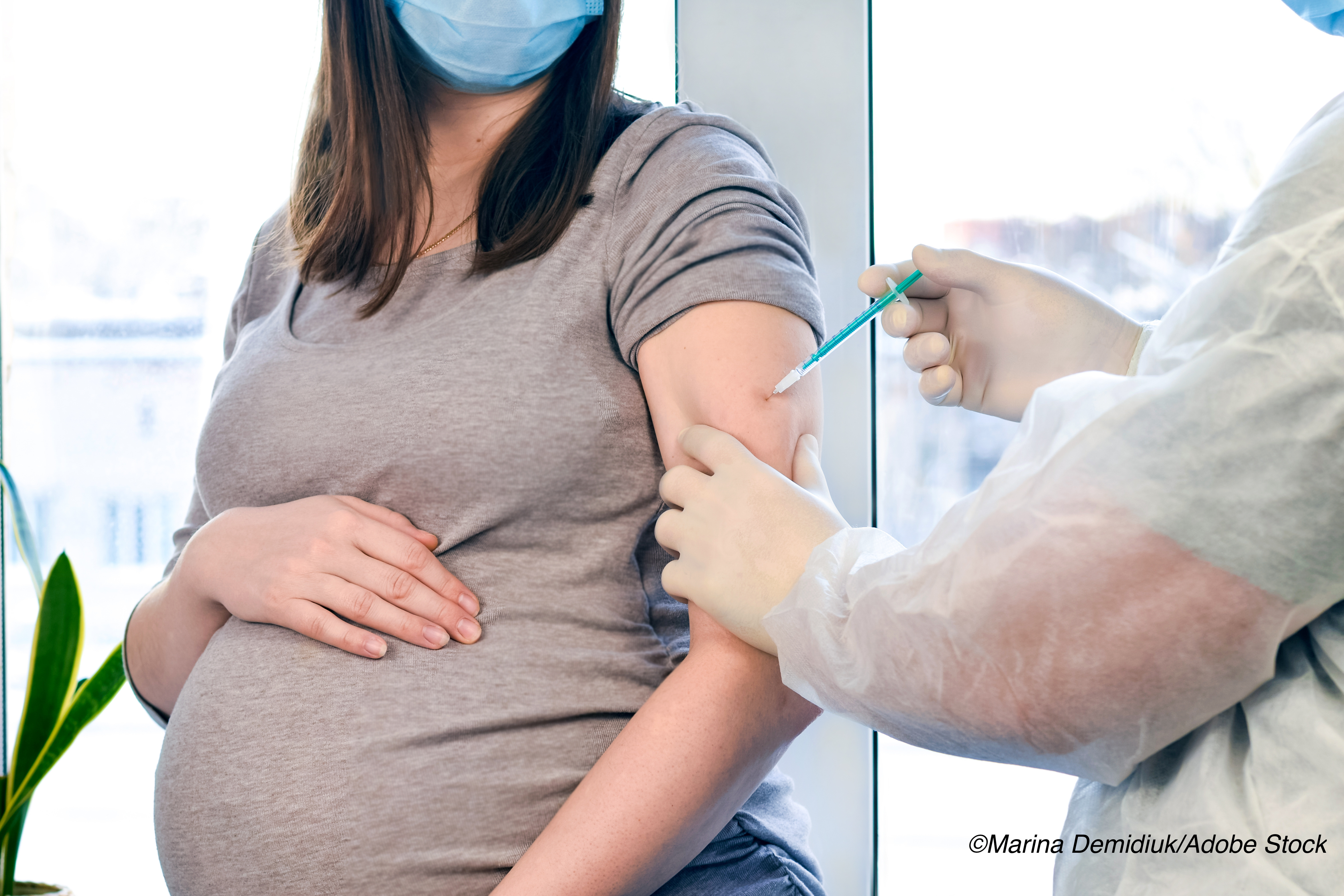Preliminary data from a U.S. CDC Covid-19 mRNA vaccine safety study show no obvious safety signals in close to 36,000 women vaccinated during pregnancy.
The analysis of data from multiple adverse event databases involving the Pfizer and Moderna Covid-19 mRNA vaccines identified no signal for worse pregnancy- or neonatal outcomes in the third trimester of pregnancy.
Researchers concluded that “continued monitoring is needed to further assess maternal, pregnancy, neonatal, and childhood outcomes associated with maternal Covid-19 vaccination, including in earlier stages of pregnancy and during the preconception period.”
The study findings were published online April 21 in New England Journal of Medicine.
Despite the exclusion of pregnant women from mRNA vaccine preauthorization clinical trials, the CDC, in collaboration with the American College of Obstetricians and Gynecologists (ACOG) and the American Academy of Pediatrics (AAP), has issued guidance noting that pregnant women should not be prevented from receiving Covid-19 vaccines due to the recognized increased risk for worse outcomes associated with having the disease.
“Post-authorization monitoring in pregnant persons is necessary to characterize the safety of these new Covid-19 vaccines, which use mRNA lipid nanoparticles, and state-of-the-art manufacturing processes,” wrote researcher Tom Shimabukuro, MD, of the CDC’s Immunization Safety Office, and colleagues.
They added that establishing safety profiles for the vaccines is critical “to inform recommendations on maternal vaccination against Covid-19.”
The researchers examined data from the CDC’s V-safe After Vaccination Health Checker surveillance system, the V-safe Pregnancy Registry, and the Vaccine Adverse Event Reporting System (VAERS) to examine the early safety of mRNA Covid-19 vaccination in pregnant women.
Data were collected from mid-December 2020 through February 2021, during which time a total of 35,691 V-safe participants (ages 16 to 54 years) identified as pregnant.
Pregnant women reported experiencing injection-site pain more frequently than non-pregnant persons, while headache, myalgia, chills, and fever were reported less frequently by pregnant women.
Among 3,958 participants enrolled in the V-safe pregnancy registry, 827 had completed their pregnancy. A total of 712 (86.1%) resulted in a live birth, mostly among participants vaccinated in the third trimester.
Adverse neonatal outcomes included preterm birth in 9.4% and small size for gestational age in 3.2%.
“Although not directly comparable, calculated proportions of adverse pregnancy and neonatal outcomes in persons vaccinated against Covid-19 who had a completed pregnancy were similar to incidences reported in studies involving pregnant women that were conducted before the Covid-19 pandemic,” Shimabukuro and colleagues wrote.
Among the 221 pregnancy-related adverse events reported to VAERS during the period, spontaneous abortion was the most frequently reported event (n=46 cases), followed by stillbirth, premature rupture of membranes, and vaginal bleeding, with three reports for each. No congenital anomalies were reported to VAERS.
The researchers noted that many of the participants in the V-safe pregnancy registry were included in the phase Ia (highest) priority vaccination group, mostly due to employment in the field of health care. They further noted that at the time of the analysis, only about 15% of women who identified as pregnant in the V-safe surveillance system had been contacted to offer enrollment in the pregnancy registry.
Other study limitations cited by the researchers included the possible misclassification of participants as pregnant and limited ability to assess the onset or duration of adverse events.
“The registry data are preliminary, are from a small sample, and describe mostly neonatal outcomes from third-trimester vaccination; the findings may change as additional pregnancy outcomes are reported and the sample size increases, which may facilitate detection of rare outcomes,” the researchers wrote. “We were unable to evaluate adverse outcomes that might occur in association with exposures earlier in pregnancy, such as congenital anomalies, because no pregnant persons who were vaccinated early in pregnancy have had live births captured in the v-safe pregnancy registry to date; follow-up is ongoing.”
Vaccination against Covid-19 protects women against the disease during pregnancy, and emerging evidence of SARS-CoV-2 antibody transplacental transfer during the third trimester suggests that it might also protect their babies, Shimabukuro and colleagues wrote.
In an audio interview with NEJM editors posted with the study’s publication on the journal website, CDC director Rochelle Walensky, MD, discussed the risks associated with having Covid-19 during pregnancy.
“I do believe we have a responsibility to try and help these women, especially given the data that demonstrate women who are pregnant have a 2- to 3-fold increased risk for an ICU stay, a 2-fold increased risk for mechanical ventilation as well as ECMO, and their babies actually have somewhere between a 2- and 4-fold increased risk of adverse outcomes,” she said. “… Given the high risk to both the mom and the baby we need to actively search for data, work on getting data, and report data on the outcomes in these women.”
She said it is important to advocate for including pregnant women in future clinical trials.
The absence of data on outcomes among pregnant women and women wishing to conceive has contributed to many myths and misinformation regarding Covid-19 vaccines, she added.
“One of the most common ones is that these vaccines can affect your fertility,” Walensky said. “We are working hard to combat that. We have no data to inform whether these vaccines can affect fertility, and there are a lot of people who having heard that are reluctant to get the vaccine. Young women who are not even trying to conceive right now are saying, ’What if I can’t conceive in a few years.’ We have no data to inform that, and we won’t have data to inform that for a very long time.”
-
Preliminary data from a CDC Covid-19 mRNA vaccine safety study show no obvious safety signals in close to 36,000 women vaccinated during pregnancy.
-
Researchers concluded that continued monitoring is needed to further assess maternal, pregnancy, neonatal, and childhood outcomes associated with maternal Covid-19 vaccination.
Salynn Boyles, Contributing Writer, BreakingMED™
The study was funded by the CDC. Shimabukuro and the other researchers reported no relevant disclosures.
Cat ID: 190
Topic ID: 79,190,730,933,190,31,926,41,192,927,151,928,925,934



